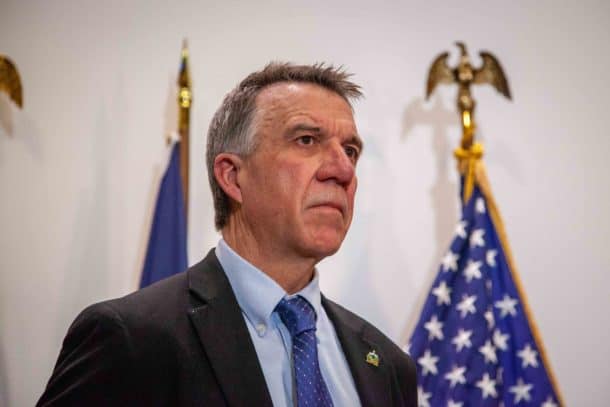By Curt Peterson
A group of lawmakers and healthcare professionals, confused by Governor Phil Scott’s failure to take more aggressive action to stem the recent surge in Covid hospitalizations and deaths, which equal last winter’s rates, publicly urged him to declare a health emergency, to mandate indoor mask-wearing, social distancing enforcement and other anti-Covid measures in the face of Delta’s surge.
Things do not look rosy. Vermont averaged 200 new infections or more per day for the past three weeks, according to data from Vermont’s Dept. of Health.
The so-called “pandemic of the unvaccinated” is a pandemic of Vermont’s children — the largest unvaccinated group is children under age 10, who, haven’t been eligible for vaccination (but those 5-11 will be hopefully this week). Children are also the group testing positive for Covid at the highest rate.
Masks, vaccinations and social distancing were working under the expired emergency declaration.
Scott said if he thought a mandate would make one more Vermonter wear a mask, he would order a mandate.
“[I]mposing broad restrictions and closures is not something Vermonters would accept nor follow,” administration spokesperson Jason Maulucci wrote in a press statement.
Rutland and Windsor County lawmakers are generally in favor of virus-fighting behavior, but have mixed feelings about an emergency declaration. Windsor County Senator Dick McCormack said his issue is “freedom.”
“People have the right to not be vaxxed against their will,” McCormack said. “For the same reason, people have the right to not have to breath other people’s possibly viral breath. ‘Your freedom to swing your fist ends at my face,’ and vice-versa.”
Choosing not to vaccinate is also choosing to be a viral “vector,” he said. The non-vaxxed have a duty to avoid others, to mask, to maintain 6-feet social distance, and to avoid shared public spaces. And, he believes it’s the state’s duty to prevent irresponsible actions by non-vaxxers.
“The governor should declare an emergency and impose the appropriate public health mandates: masks, distancing, exclusion from public places,” McCormack said.
Rutland County state representative Jim Harrison is not opposed to either an emergency declaration or, specifically, a mask mandate. However, he also feels publicly confronting the governor is not the correct path.
If it chose to, the Legislature could reconvene and write its own laws to deal with the crisis, he said.
“This is no time to second-guess the governor,” Harrison said. “I’ve shared my thoughts with him and his administration privately. We elected one governor to lead us through emergencies, so we should allow him to continue down the path to a post-pandemic Vermont.”
Rutland County Senator Cheryl Hooker thinks Scott’s is reluctant to appear to be abusing his power, but feels the current emergency requires aggressive measures.
“It seems to me that, until we can see the pandemic is truly subsiding, declaring [an emergency] would give the governor flexibility to facilitate necessary requirements without having to declare an emergency each time,” she said.
Windsor County Senator Alison Clarkson said the governor’s anti-pandemic tools include “social isolation, restricting droplet spread [masking], and vaccination.”
None of these tools alone is adequate or perfect, she said, adding that the number of adults who cannot be vaccinated, and children, who haven’t been eligible, is large. These are the vulnerable people whom masking protects from infection.
“I believe the science; I support the science,” Clarkson said. “So I support indoor masking requirements.”
Because the governor cited and supported science throughout the pandemic, Clarkson is puzzled by his reluctance to mandate indoor masking.
“I don’t feel he needs to declare an emergency again, but I wish he’d use stronger language to encourage all indoor venues to require people to mask while they are inside.”
Clarkson is confident Vermonters’ resilience will win out in the long run.
“If we can put up with mud season,” she said, “we can put up with masks.”
The Mountain Times reached out to other lawmakers, including Rutland County senators Brian Collamore and Joshua Terenzini, and Windsor County representatives John Bartholomew and Charlie Kimble, for their comments, but they did not respond.




